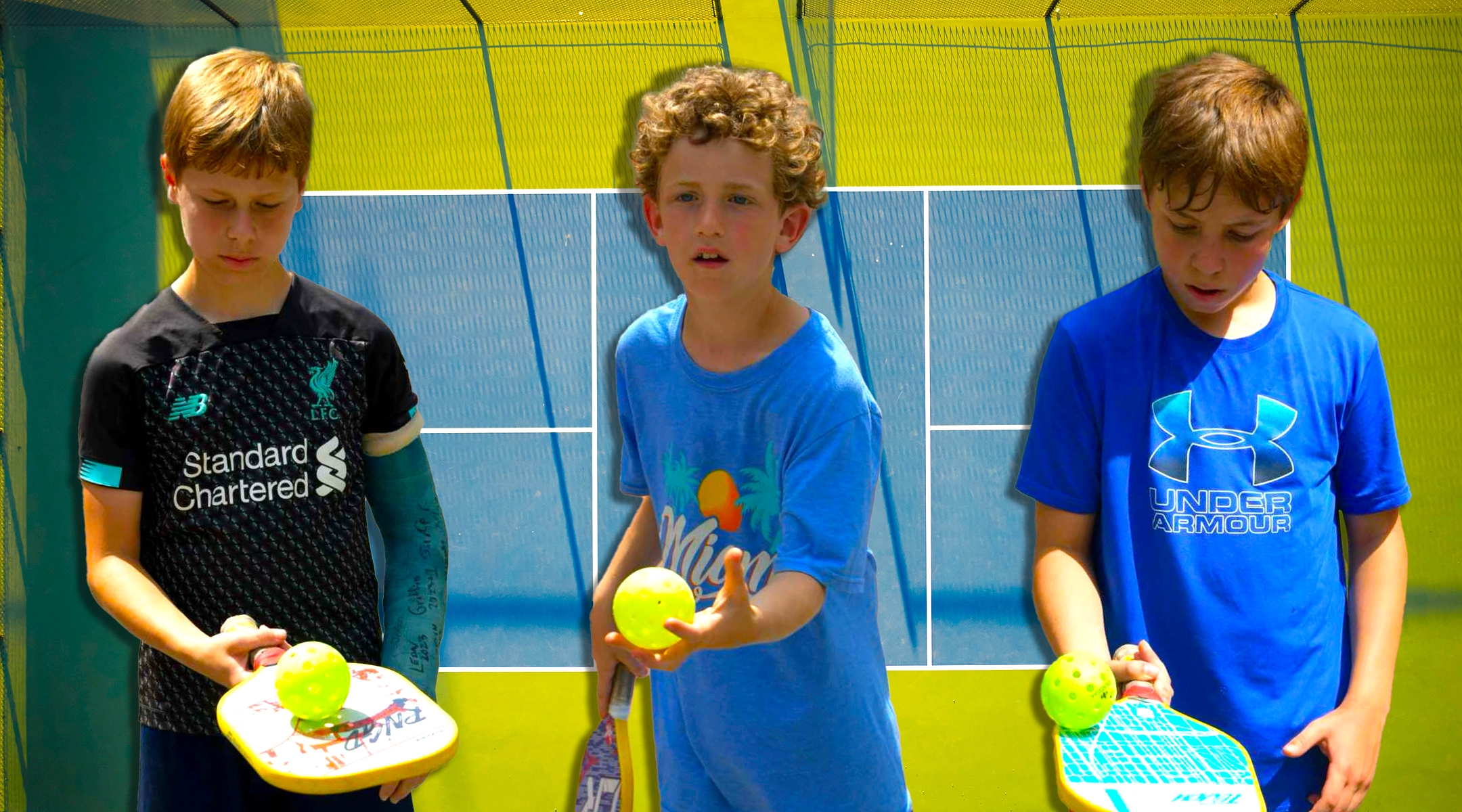Pickleball, America’s fastest-growing sport, is a hit at Jewish camps and sports tournaments
Numerous Jewish camps around the U.S. have added pickleball to their offerings

Pickleball has exploded in popularity at Jewish summer camps. (Courtesy of Camp Avoda; design by Mollie Suss)
(JTA) — As head of programming for Maccabi USA, Shane Carr is used to having people ask him to add sports to the organization’s many Jewish sports tournaments around the world.
But since 2019, one sport has been suggested above all others: pickleball.
Widely considered the fastest-growing sport in America, pickleball is a sort of condensed court tennis and pingpong hybrid that has attracted millions of new fanatics since the outbreak of the COVID-19 pandemic, from middle schoolers to the likes of Bill Gates and LeBron James. Originally created in 1965 in Bainbridge Island, Washington, the sport adapted well to the quarantine era with its short learning curve and low-cost equipment.
One study estimates that 5 million people played pickleball in 2021, while the Sports & Fitness Industry Association found that participation in the sport nearly doubled in 2022 and has increased 158.6% over the past three years.
The Jewish world is no exception to the trend. The sport is a frequent sight at Jewish community centers and camps across the country, attracting players of all ages.
Carr said the requests to add pickleball to Maccabi events “blew up” during the pandemic. And after years of conversations about the sport’s popularity and potential — plus Carr getting “tired of saying no” — pickleball will officially be played at the Pan American Maccabi Games in Buenos Aires this December.
“The great part about pickleball is it’s so approachable, and people can pick it up so quickly,” Carr told the Jewish Telegraphic Agency. “It’s a great opportunity to build community, especially Jewish community.”
Carr explained that adding a sport to the tournament is a multi-step process that included convincing the global Maccabiah body. He said the popularity of racket sports in Argentina helped their case, and that the Hacoaj sports club in Buenos Aires — where Jewish-Argentine tennis star Diego Schwartzman got his start — hosted a pickleball open house to help generate interest.
Delegations from the United States, Canada and Argentina will compete in pickleball at the Pan Am Games, and Carr said Israel could potentially join as well. The tournament will include traditional men’s and women’s singles and doubles, plus a team event and a “Pickle Palooza” offering for anyone who wants to play.
Carr also said Maccabi USA is hoping to include pickleball in the full 2025 Maccabiah Games in Israel.
The demand for pickleball has also skyrocketed at Jewish summer camps across the United States.
At Camp Avoda, a Jewish sports camp about 50 miles south of Boston, Director Ronni Guttin estimated that about 40 of the camp’s 140 campers are playing pickleball. It’s offered as an elective alongside tennis, and campers can also play during free time. Guttin lauded the sport’s accessibility, noting that it’s especially popular among kids who may find tennis too difficult.
Guttin said Avoda brought in a group of pickleball players to run a clinic for the first time last summer, and “it took off like crazy.” They brought the instructors back this summer, too.
The camp has two pickleball courts, but Guttin said that if they had five courts they would all fill up. “People are clamoring for it,” she added.
Camp Bauercrest, a Jewish sports camp 40 miles north of Boston in Amesbury, Massachusetts, did add more courts for this summer.
Director Ken Cotton said the camp had invited an alum to host pickleball clinics last year, and “the kids ate it up.” So when it came time to repair the camp’s tennis courts before this summer, Bauercrest added four outdoor pickleball courts to go along with two indoor courts.
The familiar “pop” that echoes from pickleball courts — which has caused real problems for those who live near them — has also become a common sound at numerous camps run by the Union for Reform Judaism and the Conservative Ramah movement.
Ruben Arquilevich, the URJ’s vice president who oversees its 14 camps, told JTA the sport is now offered at multiple camps, adding that it is “very popular.”
At Eisner Camp in Great Barrington, Massachusetts, one of the camp’s tennis instructors has also started teaching pickleball. Camp Newman in Santa Rosa, California, lists pickleball among its many offered activities, and the URJ’s 6 Points Sports Academy in Asheville, North Carolina, offers it as an elective.
Pickleball is also now offered at the Ramah movement’s day camp in Nyack, New York, and its overnight camp in Wisconsin, according to Ramah’s national director Amy Skopp Cooper.
At the Ramah camp in Ojai, California — about 80 miles northwest of Los Angeles — pickleball has become “the sport of the summer,” said Molly Auerbach, the camp’s program director.
Ramah California offers pickleball during its sports period, taught by a pickleball coach, as well as during free time and a weekly Shabbat pickleball tournament.
“I would say it’s become one of the themes of the summer and most people have tried it, if not become obsessed with playing it,” Auerbach told JTA.
This article originally appeared on JTA.org.
A message from our Publisher & CEO Rachel Fishman Feddersen

I hope you appreciated this article. Before you go, I’d like to ask you to please support the Forward’s award-winning, nonprofit journalism so that we can be prepared for whatever news 2025 brings.
At a time when other newsrooms are closing or cutting back, the Forward has removed its paywall and invested additional resources to report on the ground from Israel and around the U.S. on the impact of the war, rising antisemitism and polarized discourse.
Readers like you make it all possible. Support our work by becoming a Forward Member and connect with our journalism and your community.
— Rachel Fishman Feddersen, Publisher and CEO


























